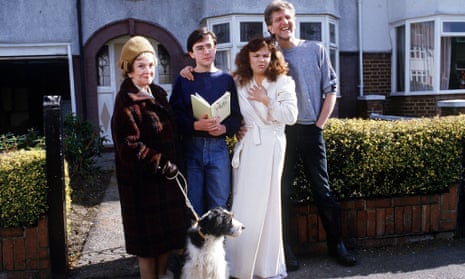For people of a certain age, the Adrian Mole diaries coincided with a growing political awareness. It wasn't til the late eighties that I caught up with the Sue Townsend's perfectly crafted characters, but the book's references to 3 million unemployed, aged communists, sudden conversions to militant feminism and nouveau riche best friends was one that played its part in shaping my own political consciousness. For who could read Adrian's masterful poem 'Do you weep, Mrs Thatcher, do you weep?' without being moved to righteous tears?
Here are some of the most memorable political lessons from the Adrian Mole series of books. Please leave your own in the comments thread below.
1) Thatcher has 'eyes like a psychotic killer, but a voice like a gentle person'
The Adrian Mole books are full of political signifiers, and in the early diaries Adrian often acts as the voice of conservatism railing against the rapidly changing times. His description of Thatcher, though, chimed with many: "I'm not sure how I will vote. Sometimes I think Mrs Thatcher is a nice kind sort of woman. Then the next day I see her on television and she frightens me rigid. She has got eyes like a psychotic killer, but a voice like a gentle person. It is a bit confusing."
2) The Female Eunuch is a very powerful book
Adrian's mother, Pauline, becomes a 'new woman' after reading Germaine Greer's seminal text: “My mother has gone to a woman’s workshop on assertiveness training... my mother came home and started bossing us around.”
She also took part in the anti-nuclear peace camps around Greenham Common, or, as Adrian obliviously wrote, "my mother has gone out with Mrs Singh, Mrs O'Leary and her women's group to have a picnic on Greenham Common."
3) The royal family should go and live on a council estate
Bert, the Woodbine smoking Communist whom Adrian befriends, made this suggestion one Christmas. Susan, Adrian's aunt, replied: "oh no dear, that's a bit drastic. Milton Keynes would be more suitable."
Townsend expanded the idea into her novel, The Queen and I, in which a left-leaning populist leader does indeed force the Royal Family out of their palaces and to come to terms with normality.
4) Blair's babes aren't to be trusted
It seems like a long time ago now - and even typing 'Blair's babes' makes me realise, with some degree of glee, how far we've come since the nineties - but Pandora Braithwaite was the perfect depiction of an upwardly mobile New Labour poster girl in The Cappuccino Years. Though, to be fair to her, she did later oppose the Iraq War.
5) The SDP tore the left asunder
The precise implications of the 'Gang of Four' and the split from Labour were lost to me as a 9 year old, but I could see the impact it was having on the Braithwaites' marriage. Pandora's mother favoured the SDP, whereas her father was a Tony Benn man - and accidentally resigned as Chairman of the local Labour party when Adrian unhelpfully sent his drafted letter.

Comments (…)
Sign in or create your Guardian account to join the discussion